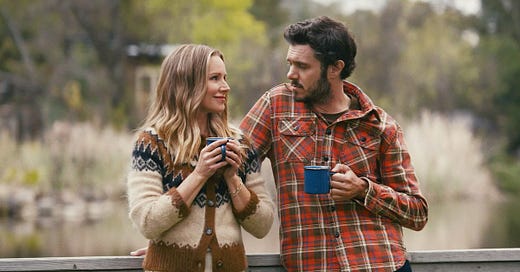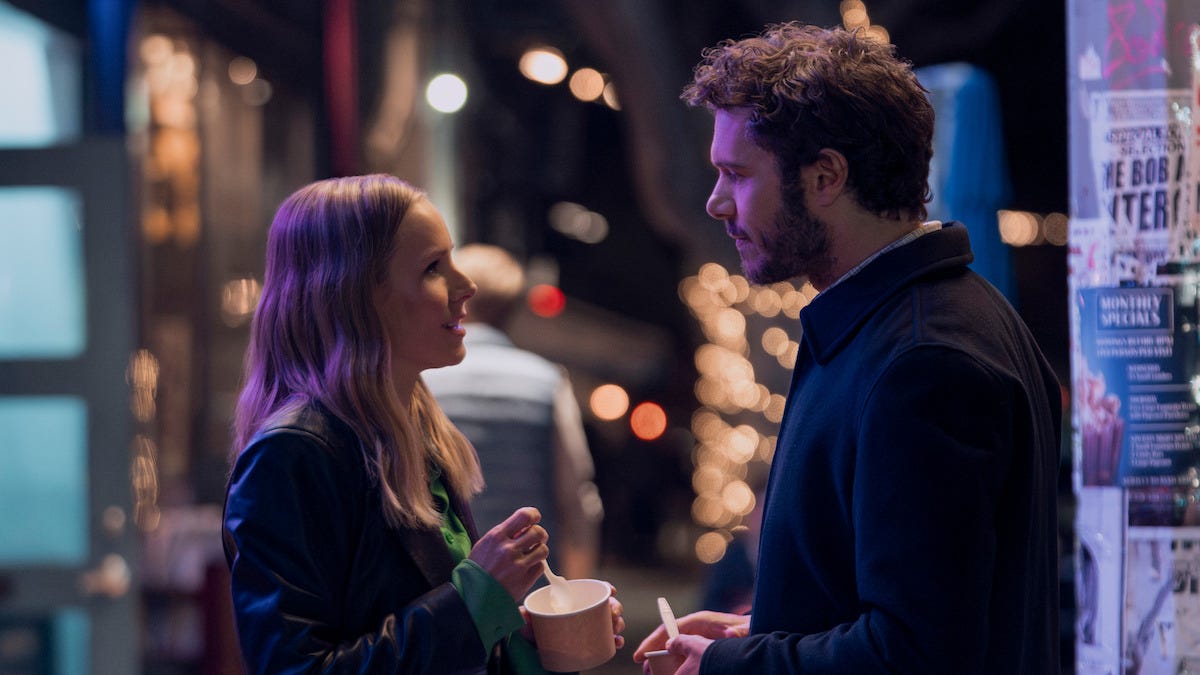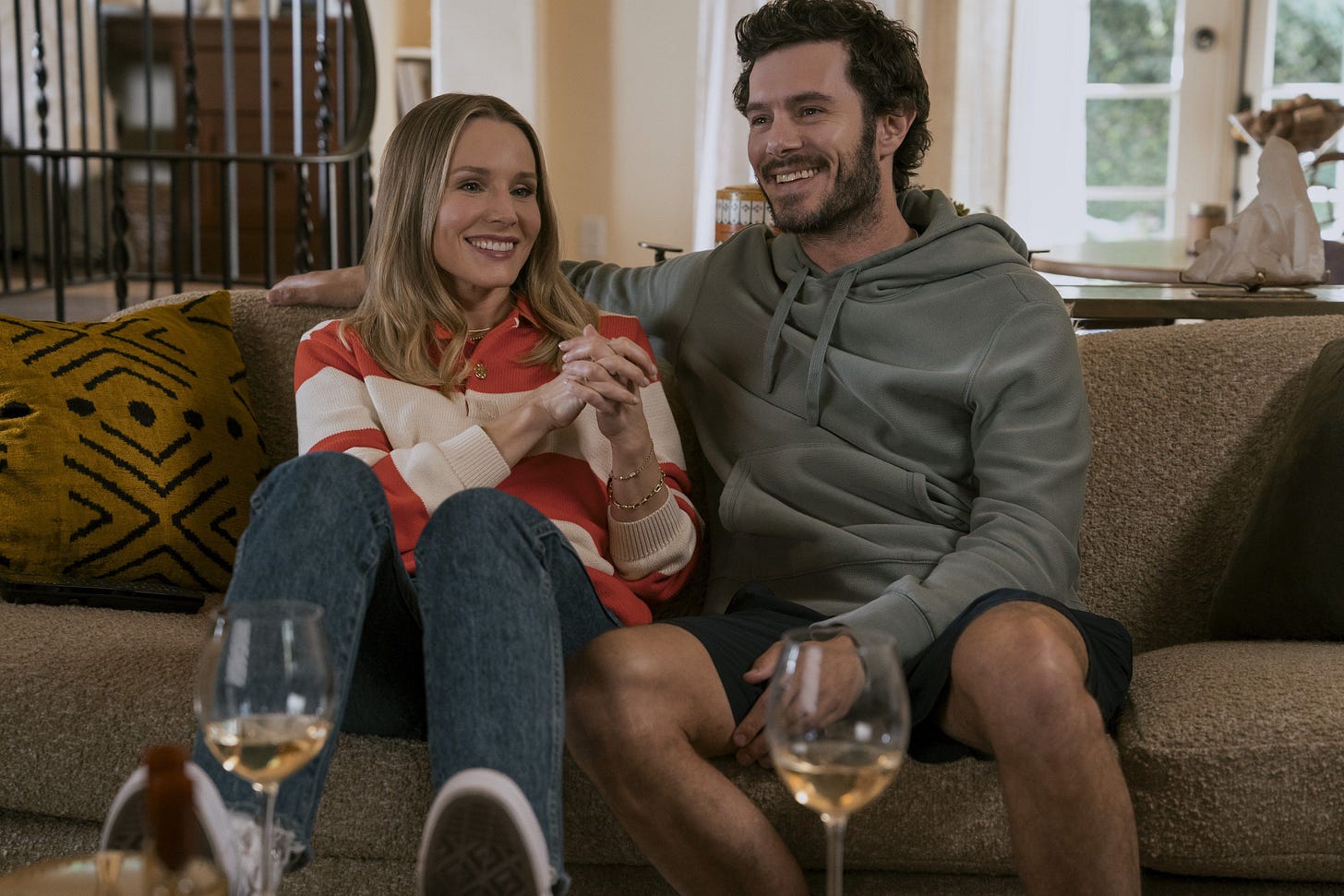Nobody Wants This has revived a dead genre
Hey girl, wake up! The rom-com renaissance is here.
*This post contains spoilers*
Thank you for reading this post! Note: Nothing I write is currently behind a paywall as I’d like to reach as many people as possible. If you are enjoying As Seen on TV, consider upgrading to £4/month, or £46/year. To learn more, click here:
*If you’re already subscribed for free, click on “✓ Subscribed” and then change your subscription plan to a paid one when the “Manage your subscription” page pops up.
London, Friday morning. I was sitting at my dining table in my small flat, eating a breakfast bowl of yoghurt, fruit and gluten-free granola. My phone lit up. Texts began to flood into the group chat from my friend Clara. There’s this new series, on Netflix called Nobody Wants This, she typed. And it’s SO good, I would say on par with Harry Met Sally.
I couldn’t get the Harry Met Sally comparison out of my head, nor could I shake off how excited she was about it. Could it be? Was the rom-com renaissance finally upon us?
She was right.1 Nobody Wants This (2024) was nauseatingly good. Like, so good. So good I’m angry that I don’t have the skills nor the patience to craft such a beautiful, composed story.
The show follows the love story of Joanne, an agnostic sex podcaster, and Noah, a recently single rabbi. Set in Los Angeles, Joanne and Noah attempt to build a healthy relationship despite their meddling families, an obsessive ex-girlfriend and major lifestyle differences.
Despite the show taking place in modern Lost-Angeles suburbia — a setting I don’t usually enjoy or gravitate towards — Nobody Wants This has definitely entered the champions league of classic romantic comedies. But why?
Well, I’ve concluded it’s largely down to a) directorial decisions which were also translated very well within post-production / in the editing room and b) Creator Erin Foster’s writing choices, particularly in the first episode.2
Reader, allow me to elaborate.
I recently wrote about how Bridgerton's third season failed to make its audiences feel excited about Penelope and Colin’s love story. While I largely put blame on the writing, I think there was also something to be said about choices that were and weren’t made in the editing room: we, the audience, weren’t allowed to see or feel chemistry between the protagonists; the editing during the infamous Hot Air Balloon scene was fast and choppy, making it difficult for us to decipher what Penelope was feeling, and throughout show the camera did not linger long enough to catch anyone’s yearning stares for more than a few seconds.
In Nobody Wants This, however, we are painfully aware of how much sexual tension there is between Joanne and Noah. The camera work is slow, it lingers on Joanne’s face a little too long while she’s listening to Noah speak. The camera is shaky in the synagogue to mimic the characters inner anxiety at meeting again for the first time after the dinner party. Our lovers have their own music score that was its most intense during their first kiss, and boy, that’s precisely what drew me in. The team behind this show made it a point to remind us that the tense, silent moments outside of dialogue are sometimes even more important than the ones with.
The pilot episode was as close to perfection as it gets because Foster managed to answer this key question in twenty-five minutes: why should we care about these specific people and their specific story?
Well, we care because Joanne is flawed. She’s picking emotionally unavailable men to date and has never experienced a healthy relationship. The most recent date she went on was a disaster. We’re curious to see who she chooses next. We care because Noah has never truly been in love. Because of this, he’s decided to do the honest, good thing and break up with his girlfriend Rebecca. He seems stable, healthy even. He’d probably be good for Joanne. Noah and Joanna meet at a dinner party. We’re curious to see if she’s going to fuck it all up.
The secret ingredient to writing a perfect love story is also this: do our characters feel known? Foster makes sure they do. Noah is the only person in Joanne’s life who understands that her podcast is more than just anecdotal, fluffy ramblings about sex. He also listens to her, like actually engages with what she says. He isn’t afraid of how much baggage she is bringing to the relationship. Joanne is the only women in Noah’s life who has made him feel the ‘spark’ — she appreciates his enduring patience, and doesn’t give up on him when he makes mistakes.
This video essay by
explored how the quality of romantic comedies being made have been declining. There have been some signs, however, that a renaissance has been brewing. To All The Boys I’ve Loved Before (2018) and Crazy Rich Asians (2018) for example are regularly on people’s rewatch list.I think the reason why we are so attached to 1990s romantic comedies is because the obstacles have felt real, the stakes have felt high. The film Anyone But You (2023) and the novel Happy Place by Emily Henry are the first pieces of media that come to mind that haven’t had believable obstacles. The core reason the protagonists aren’t together come from a misunderstanding early on in the plot, or the continuous inability for the characters to communicate how they really feel.
Fair enough, miscommunication is often the cause of a lot of interpersonal conflict in real life, but I think audiences yearn for something deeper in a fictional story. Because we’re escaping into a world that isn’t real with only a limited number of hours or episodes to contend with, miscommunication as an obstacle to why people can’t be together isn’t enough. It isn’t enough to make us feel something.
In her review of Nobody Wants This written for The Guardian, Lucy Mangan affirms “beneath it all, the emotional stakes feel real. The pair’s different cultures, the lack of faith versus religion as a guiding force, the disapproval of families, potential ostracism, the possible impact on Noah’s career, the circumscription of Joanne’s freedom if she did become a rabbi’s wife – these are genuine problems, obstacles to happiness with no obvious answers.”
My Best Friend’s Wedding (1997) has remained a classic because it’s a great case study that illustrates how women don’t have to be likeable to be interesting, nor do women have to be likeable for audiences to root for her. A flawed woman is compelling, she’s real, she’s relatable.
In episode six, Joanne gets the ick after seeing Noah, sunflowers in tow, turn up to her house to meet her parents in his ‘sports coat’. She tells her sister that she’ll have to break up with him immediately. Noah, however, has noticed that something isn’t quite right with Joanne. He meets her outside and calls her out: he’s healthy and good for her, and she’s subconsciously trying to destroy a good thing. She has struggled to love and be loved fully, because her mother has chased after her emotionally unavailable father her whole life. It’s a classic case of self-sabotage.
He then says four little words that I hadn’t even realised I wanted to hear from a partner: I can handle you.3 I mean, that’s the ultimate fantasy isn’t it? To be told it’s completely safe to be yourself? To think you are hard to love but be proven wrong?
Nobody Wants This hasn’t just brought back the butterflies, it’s also taking rom-coms one step further: the portrayal of love feels evolved and emotionally intelligent. It’s one of the few television shows I’ve seen that depicts a healthy romantic relationship onscreen, and its popularity has only shown that this is exactly the kind of nuance audiences have been yearning for from television.4
Throughout the show, Foster so cleverly tapped into our fundamental human desire to be fully seen, heard and known by the people we love. By the end of the season finale, every single person wanted what Noah and Joanne have.
Not that I ever doubted her.
Since writing the second draft of this post, it has come to my attention that Erin Foster has posted various social media stories in support of Israel’s settler colonialism project in Palestine. It has left me with mixed and conflicting emotions, and I do not know what else to say except this is a beautiful piece of art, but it’s been made by someone whose political opinions I despise and disagree with. For now, I am living with both of those truths.
Noah is so fantasy-fulfilling, just like Hot Priest in Fleabag (2016).
I wish people of colour had rom-coms like this to consume! I don’t need the cast to be South Asian for me to be able to relate to their experiences, but I think we’re long overdue for stories that make us feel warm inside but also reflect the culture and world we grew up in. Television executives should be buying stories from us, too!







